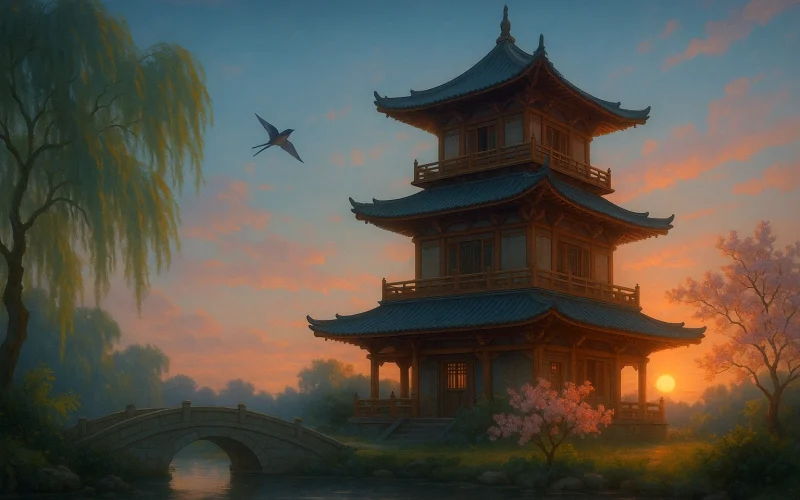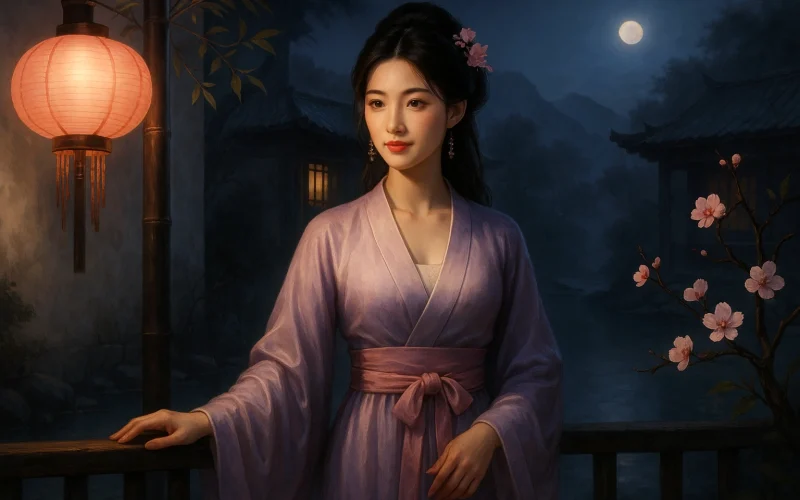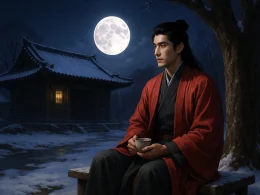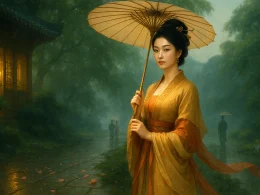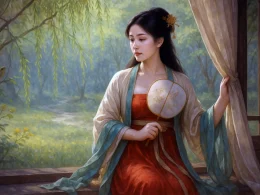Morning clouds hang like loosened threads,
Towers wear spring's faint grace.
Willows weep, flowers wail,
Nine streets sink in mud,
Swallows linger at the gate.
Now bright sun gilds golden rooms,
Spring lives on peach boughs.
Unlike those days—
When rain lashed our small tower,
Two hearts nursed secret sorrow.
Original Poem
「少年游 · 朝云漠漠散轻丝」
朝云漠漠散轻丝,楼阁淡春姿。
柳泣花啼,九街泥重,门外燕飞迟。而今丽日明金屋,春色在桃枝。
周邦彦
不似当时,小楼冲雨,幽恨两人知。
Interpretation
Composed during Zhou Bangyan's sojourn in Jingzhou, this ci juxtaposes misty spring rains with past affections to articulate the poet's complex emotions—both the anguish of separation and the quiet joy of reunion. The first stanza paints a melancholic morning scene steeped in drizzle and sorrow, while the second shifts to present brightness and shared warmth, though tinged with lingering nostalgia. Characteristic of Zhou's restrained yet profound style, the poem interweaves scene and sentiment with exquisite precision, embodying the aesthetic ideals of subtlety and depth in Song dynasty lyric poetry.
First Stanza: "朝云漠漠散轻丝,楼阁淡春姿。柳泣花啼,九街泥重,门外燕飞迟。"
Zhāo yún mò mò sàn qīng sī, lóu gé dàn chūn zī. Liǔ qì huā tí, jiǔ jiē ní zhòng, mén wài yàn fēi chí.
Morning clouds unravel fine silk threads,
towers wear spring's pale attire.
Willows weep, blossoms sob,
nine streets sludge-thickened—
swallows dawdle at my gate.
The opening stanza constructs a watercolor of melancholy. "Unraveled silk threads" (散轻丝) transforms drizzle into celestial weaving, while "spring's pale attire" (淡春姿) suggests nature's muted mourning garb. Personification reaches its zenith in "weeping willows" (柳泣) and "sobbing blossoms" (花啼), where botanical grief mirrors human sorrow. The "sludge-thickened streets" (泥重) and "dawdling swallows" (燕飞迟) externalize emotional inertia—the poet's world slowed by the weight of memory and separation's muddled aftermath.
Second Stanza: "而今丽日明金屋,春色在桃枝。不似当时,小楼冲雨,幽恨两人知。"
Ér jīn lì rì míng jīn wū, chūn sè zài táo zhī. Bù sì dāng shí, xiǎo lóu chōng yǔ, yōu hèn liǎng rén zhī.
Now sunlight gilds our chamber,
spring riots on peach boughs.
Unlike those days when rain
assailed our attic retreat—
secret regrets we two alone knew.
The second stanza pivots with temporal clarity ("Now sunlight…"). The "gilded chamber" (明金屋) symbolizes domestic bliss and stability, while "spring riots" (春色在桃枝) captures nature's exuberant celebration of reunion. Yet this brightness is shadowed by the recollection of "rain-assailed attic" (小楼冲雨) days—those clandestine meetings drenched in shared melancholy. The phrase "secret regrets we two alone knew" (幽恨两人知) lingers like perfume, intoxicating in its intimacy and heartbreaking in its exclusivity: a sorrow too profound to be communicated beyond the lovers' private lexicon.
Holistic Appreciation
Zhou orchestrates a masterful interplay of meteorological and emotional climates. The first stanza's "unraveled silk" drizzle and "sludge-thickened" streets evoke the viscous passage of time during separation, where even swallows—traditional heralds of spring's vitality—move with leaden wings. In stark contrast, the second stanza's "gilded" light and riotous peach blossoms proclaim love's triumphant return, yet this victory is tempered by the indelible memory of "rain-assailed" intimacy.
The poem's structural brilliance lies in its chromatic progression: from the first stanza's monochrome palette ("pale attire," "sludge-thickened") to the second's radiant hues ("gilded chamber," "peach boughs"). This visual transformation mirrors the lovers' journey from sorrow to joy, while the lingering "secret regrets" add emotional chiaroscuro—brightness forever haunted by its own shadows.
Artistic Merits
- Textile meteorology
Rain as "unraveled silk threads" (散轻丝) exemplifies Zhou's genius for transforming weather into tangible artistry. - Architectural emotion
The contrast between "towers wearing spring's pale attire" (楼阁淡春姿) and "gilded chamber" (明金屋) maps emotional evolution onto physical structures. - Botanical lament
"Weeping willows" (柳泣) and "sobbing blossoms" (花啼) achieve the pinnacle of pathetic fallacy in classical Chinese poetry. - Chronological alchemy
The pivotal "Now sunlight…" (而今丽日) performs temporal alchemy, transmuting leaden memories into golden present.
Insights
Zhou's poem reveals love's paradoxical nature—its most profound connections often forged in adversity ("rain-assailed attic") rather than comfort ("gilded chamber"). The work suggests that true intimacy resides not in the sharing of joy, but in the mutual custody of "secret regrets" (幽恨两人知)—those unspoken understandings that bind souls more tightly than any vow.
For contemporary readers, the poem offers a meditation on emotional archaeology: how present happiness is always layered over past sorrows, like sunlight gilding a once-dreary chamber. Zhou reminds us that the brightest joys derive their luminosity from contrast with remembered darkness, just as the "riotous peach boughs" gain vibrancy against the mental backdrop of "weeping willows."
Ultimately, the poem posits that love's deepest language is untranslatable—those "secret regrets we two alone knew" constitute a dialect as private and irreproducible as fingerprints. In an age of oversharing, Zhou's discreet elegance whispers the enduring power of emotional reserve—how the most precious feelings often reside precisely in what remains unspoken, known only to those who have weathered storms together in tiny attics, listening to the rain.
About the Poet
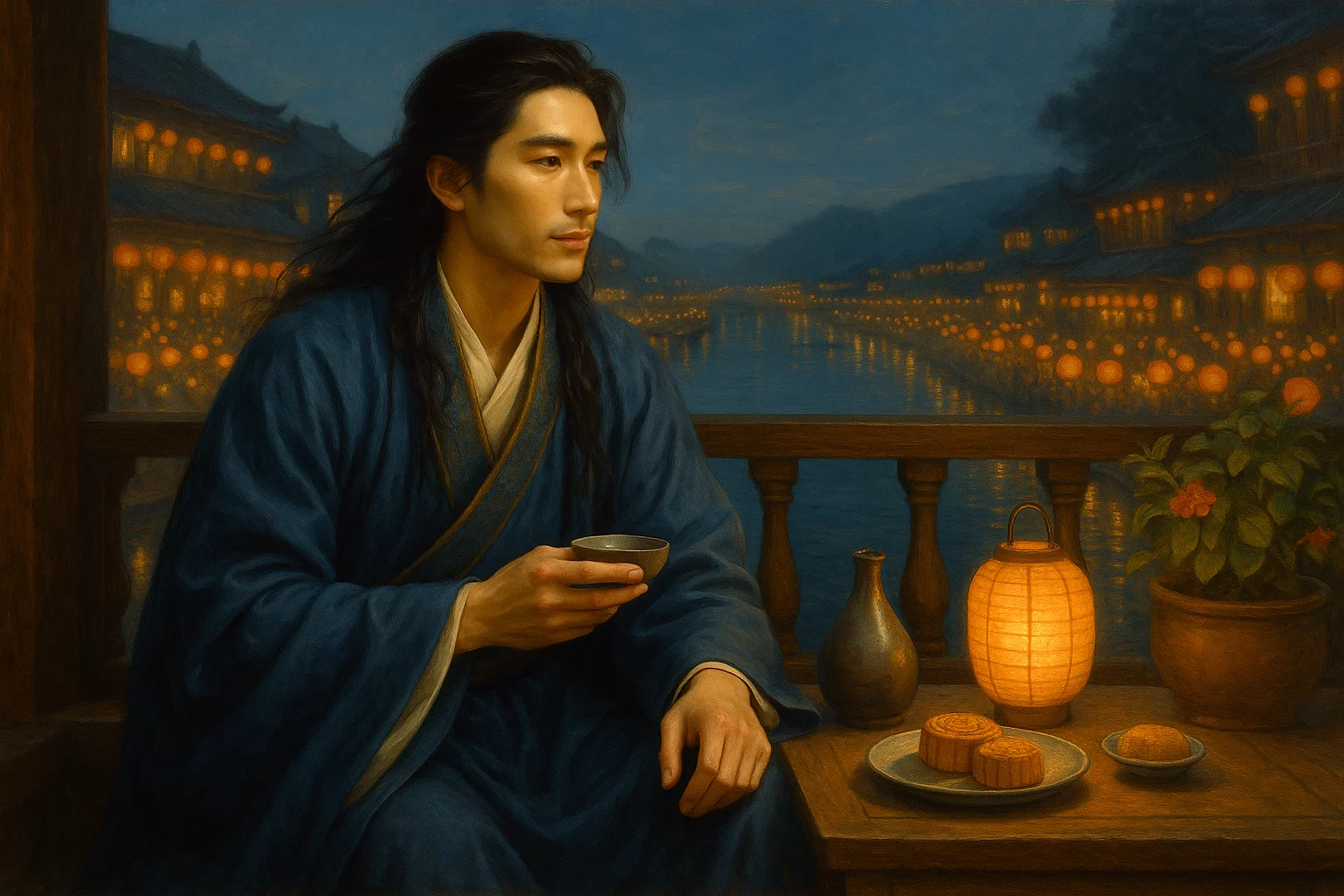
Zhou Bangyan (周邦彦 1056 - 1121), a native of Qiantang (modern Hangzhou, Zhejiang), was the culminating master of the wanyue (graceful and restrained) ci poetry of the Northern Song Dynasty. A virtuoso in musical temperament, his ci are renowned for their opulent refinement and technical perfection. He created dozens of new melodic patterns (cipai) and adhered to strict tonal rules, earning him the title "Crown of Ci Poets." His influence extended to Southern Song masters like Jiang Kui and Wu Wenying, establishing him as the founding patriarch of the Rhymed Ci School.






